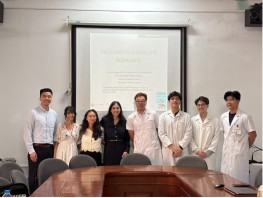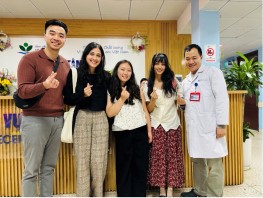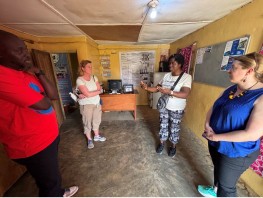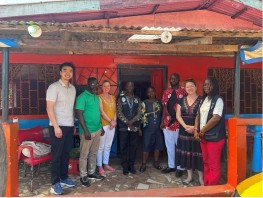Learning to Listen: Reflections from Vietnam and Liberia
By: Vinh-Son Nguyen, M.D. Child and Adolescent Psychiatry Fellow, Boston Children’s Hospital and Hesham Hamoda, MD, MPH, Co-Director, Global Health Program, Department of Psychiatry and Behavioral Sciences, Boston Children's Hospital.
I used to think of global health as something we do out there—a well-intentioned effort to bring expertise to under-resourced settings. But after my recent visits to Vietnam and Liberia, I’ve come to realize that framing is not only outdated—it’s incomplete. At its best, global mental health is rooted in presence, partnership, and bidirectional learning. And for trainees, it can be one of the most meaningful opportunities to grow—not just as clinicians, but as people.
As a child and adolescent psychiatry fellow, I recently had the chance to work with pediatric trainees in both countries. In Vietnam, I co-led teaching sessions for Vietnamese medical students and residents with my team which included pediatric resident Lydia Sobhi, and medical students at the University of Texas Health Science Center at San Antonio, Sophia Koo and Sana Suhail. Our focus was on recognizing and responding to anxiety and depression in children and adolescents—issues they frequently encountered but felt underprepared to manage. The conversations were honest, grounded, and deeply human: How do we talk to children about the fear of death? How do we support families when a sibling is struggling? How do we honor cultural beliefs while still advocating for patient autonomy?

Figure 1. Delivering a lecture on depression in children and adolescents to Vietnamese medical students during their psychiatry rotation. We discussed how depression can present in children and the importance of addressing youth mental health challenges.

Figure 2. Our visiting team meets with a child psychiatrist at Hanoi National Pediatric Hospital. We exchanged insights on improving access to pediatric mental health services in Vietnam and discussed strategies to strengthen cross-cultural collaboration in care. (Pictured from left to right: Vinh-Son Nguyen, Lydia Sobhi, Sophia Koo, Sana Suhail, and Quyet Nguyen).
Teaching in Vietnam also came with a personal dimension. As a Vietnamese American, I expected to feel a sense of familiarity. Instead, I found myself walking a line between insider and outsider—fluent enough to catch the jokes, but not always enough to join in; connected to the culture, yet still aware of the distance. It was a humbling reminder that cultural humility isn’t something we master after one visit or one trip—it’s a lifelong practice.
In Liberia, our team which included Stacy Drury, Chair of the Department of Psychiatry and Behavioral Sciences at Boston Children’s Hospital and Michelle Niescierenko, Director of Global Health at Boston Children’s Hospital, visited a variety of sites.
Upon our arrival to the national hospital we asked the pediatric residents what topics would be most useful to them. Their response was clear: they wanted help distinguishing between psychosis and delirium in children, and guidance on when to involve psychiatry. So, we built our session around their needs. We thought through together how to psychiatrically assess a patient in a systematic way, similar to how they normally think through cases. The questions were sharp, relevant, and culturally insightful. Access to labs and imaging was limited, but the clinical commitment to doing the best with what was available was unwavering.

Figure 3. In Bomi County, Liberia, our team toured Teach Teens to Fish with its founder, Shirley Seckey, RN, FWACN and Ministry of Health mental health clinician, Eric Weah. Shirley described the impact it has had on the community and her plans to expand to neighboring villages. (Pictured from left to right: Eric Weah, Stacy Drury, Shirley Seckey, and Michelle Niescierenko)

Figure 4. Gathering with members of Liberia’s Ministry of Health Mental Health Unit to discuss national priorities in child and adolescent mental health and substance use initiatives.
One of the most memorable moments came during a visit to a community program called Teach Teens to Fish, which educates teens about entrepreneurship and sexual reproductive health. We met a young girl who proudly showed us the bead bracelets she had made, along with book covers and menstrual hygiene pouches crafted from recycled rice bags. She beamed as she explained how she had learned to make them—excited to share not just her creations, but the skills and confidence she had gained in the process. It was a simple exchange, but it underscored something essential: global health isn’t just about diagnoses or treatment algorithms—it’s also about empowerment, dignity, and joy. Programs rooted in community ownership often reach young people in ways formal systems cannot.
Despite how different these two cultures are—separated by continents, language, and history—I was struck by their shared strength. Both Vietnam and Liberia carry the weight of devastating wars. And yet, in both places, the people I met were resilient, optimistic, and focused on building something better for the next generation. That quiet, steady determination was everywhere—in the residents reviewing cases after hours, in the medical students asking hard questions, in the teenagers proud to share what they had made with their own hands.
The human spirit to endure, to adapt, and to grow—despite adversity—is not unique to any one country. It lives in all of us. And witnessing that spirit firsthand, across two very different settings, reminded me of the universal foundations of this work: healing, connection, and hope.
These experiences reinforced my belief that global mental health education should be a core part of training. We practice differently when we lead with humility. We teach more effectively when we listen first. And we grow most when we show up—not as experts, but as partners. The future of psychiatry won’t be built solely in hospitals and clinics, but also in classrooms, community centers, and homes around the world—places where care begins with connection, not credentials.
For trainees, global health offers more than a chance to explore new health systems—it sharpens empathy, challenges assumptions, and invites reflection on the kind of psychiatrists we want to become. I entered this work hoping to share what I knew. I left with a deeper understanding of what I still needed to learn.
Global mental health isn’t about saving—it’s about standing alongside. It’s about seeing others more clearly, and in doing so, seeing ourselves with more honesty, too.
And for me, that’s where the real learning begins.
Reflections from Dr. Hamoda:
It’s been an amazing and humbling experience to supervise Vinh-Son during his global mental health elective and witness his growth, which is captured in this lovely reflection. This elective in global mental health, being offered for the first time at Boston Children’s Hospital Psychiatry and Behavioral Sciences Department, provides our trainees with an opportunity to engage in a variety of activities whether educational, research or service to further their knowledge and skills in global mental health.
Child and Adolescent Psychiatry trainees should be on the forefront of global mental health efforts that improve the lives of children and families worldwide. Learning and growth do not only happen in the clinic in our home countries, but working globally expands our horizons and helps trainees truly understand the social determinants of health and the role of equity in global health. This understanding also allows them to better address domestic needs particularly in marginalized and low resourced settings in their home countries. As Vinh-Son emphasized, the learning is bidirectional, can be truly transformational and that learning to listen, to truly listen, is one of the most important skills we need to learn as mental health professionals. I encourage all trainees to consider experiences in global mental health.
I leave you with this lovely quote from Paul Farmer:
“The idea that some lives matter less is the root of all that is wrong with the world.”
Note from the editor: Due to a conflict of interests pertaining to Dr. Hamoda, the editorial process was handled by Deputy Editor Dr. Lakshmi Sravanti
This article represents the view of its author(s) and does not necessarily represent the view of the IACAPAP's bureau or executive committee.

